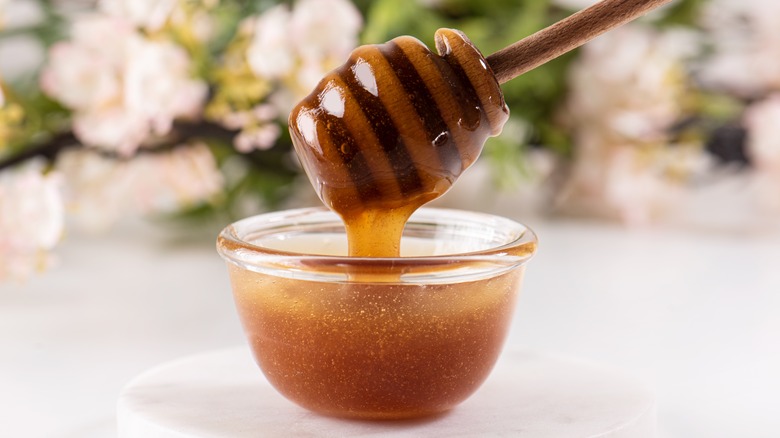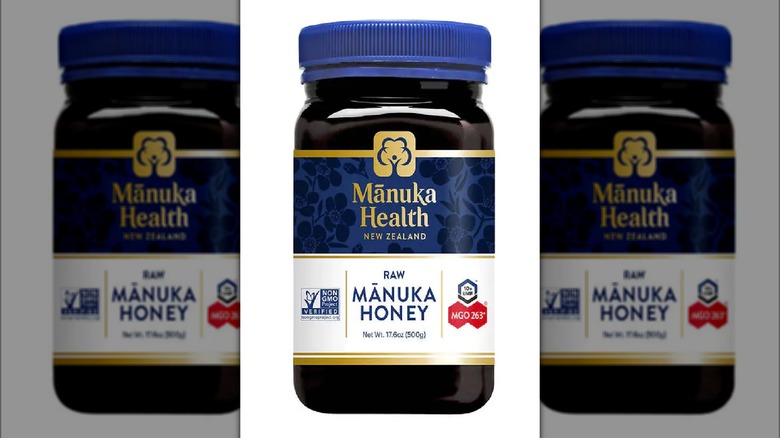Why It Pays To Buy Manuka Honey At Costco
Honey has been revered for its medicinal purposes for centuries– ancient Greek, Mayan, and Chinese civilizations recognized honey's healing abilities in tandem with its sweet flavor. Today, honey is still recognized for its healing abilities and its anti-inflammatory and antibacterial properties.
One particular variety called manuka honey has been making waves in the health food world for both its medical and monetary value. Pure manuka honey is available through most retailers, and a 17.6-ounce bottle of manuka honey will run you about $30 from Costco. These prices are on par with other vendors, but one thing Costco has that others do not is an official UMF (Unique Manuka Factor) certification which comes from the manufacturers of this honey themselves. Manuka honeys with UMF certification are the real deal, and if this hyped-up honey is going to find its way onto your shopping list, you should look for the UMF certification on the label.
With some UMF-certified honey in your pantry, you can start adding it to your steaks to get perfect grill marks on your proteins or stir it into your morning coffee for a bit of sweetness to start your day. Regardless of how you'd like to use manuka honey in your repertoire, here are some reasons why Costco's manuka honey is a cut above the rest.
What is manuka honey?
Manuka honey comes from leptospermum scoparium, commonly known as the manuka tree or New Zealand tea tree. As the name implies, it's only found in New Zealand, and it plays a crucial part on the harvesting of manuka honey. When Western honeybees are within pollinating distance to one of these aromatic shrubs, they'll use its pollen and nectar to make manuka honey. While this variation of honey can be used for many of the same medicinal purposes as clover honey or really any other honey produced worldwide, there are some scientific studies that praise manuka honey for its increased ability to heal wounds, fight infections, and provide antioxidants.
The chemicals that set manuka honey apart from other honeys are methylglyoxal (MGO), which has antibacterial properties, and leptosperin which is an anti-inflammatory agent. Scientists believe they are the main factors in manuka honey's ability to heal the human body.
As beneficial as a bit of manuka honey can be to adults, it's important to note that most makuna honeys are raw and unpasteurized, which means you should avoid giving them to infants.
What's so great about UMF certification?
UMF stands for "unique manuka factor," and it's a baseline for determining a batch's concentration of medicinal chemicals. When looking at UMF-certified honey, you'll usually see a number from 5 to 25. This number determines how many milligrams of MGO and leptosperin are found inside each batch. Lower UMF numbers denote a honey that would be good to use for cooking or snacking. A higher UMF number puts manuka honey into more of a medicinal category. Currently, Costco shoppers can get manuka honey from 5 to 20 UMF.
UMF certification requires an exhaustive test battery that uses a four-factor quality assurance test to measure manuka honey's potency, authenticity, freshness, and shelf life. Manuka honey that doesn't carry UMF certification hasn't undergone the same rigorous testing, and could therefore be lacking in the chemicals that make manuka honey beneficial in the first place.
Shoppers will also see an MGO rating applied to their manuka honey, and while this means a particular variety could be high in antibacterial methylglyoxal, it's not considered to be the same as UMF certification. Costco is unique among retailers in that its two manuka honey brands — Manuka Health and Comvita — are both UMF-certified.


